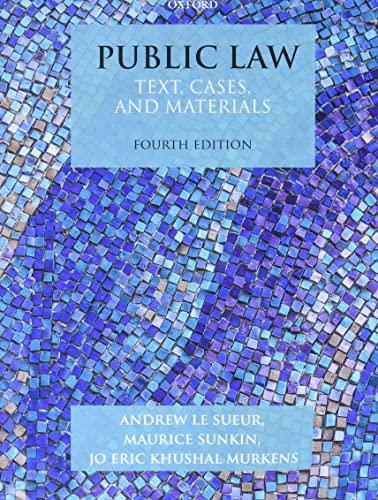Question
Richard Singson, a director of the Fairview Medical Clinic, one of the few medical service providers in a small rural town, employed two physicians Andrew
Richard Singson, a director of the Fairview Medical Clinic, one of the few medical service providers in a small rural town, employed two physicians Andrew and Janelle Whittamore to fill open spots for a pediatrician and gynecologist. The recruiting process had been extensive and difficult. The fact that the Physicians were married was not a problem at the time they were hired. Fairview likes to keep its doctors and generally pays them well for their services. The clinic is also concerned about maintaining its patient load and income. It requires every doctor who joins the medical practice to sign a five-year contract detailing what he or she is to be paid and conditions that will apply should the contract be broken by either party. One of these conditions is a covenant not to compete, or a no-competition clause, stating that should a doctor chose to leave the clinic prior to the expiration of agreement, he or she will not be allowed to open a competing practice in that town or county during the time remaining on the contract. Violation of the clause will result in an undefined financial penalty. The clause is designed to prevent a staff doctor from building up his or her reputation and clients at the clinic and leaving before the term of the contract has expired, starting a new and competitive practice in the community and taking patients with him or her.
When Janelle and Andrew joined the Fairview staff they each signed the contract. Both doctors performed well in their jobs and where respected by their colleagues and patients. Unfortunately their marriage went in to a steady decline almost as soon as they began working in Fairview. Their arguments increased, and the tension between them mounted to the point that they decided to divorce. Because they both wanted to continue to co-parent and be near their two young children, they agreed that they would like to continue living in the same town. Every physician has a specialty and all rely on consultation with colleagues, so some interaction at work between the estranged couple was inevitable. Over time however, their mutual hostility grew to such an extent that they had difficulty being in the same while performing their duties. Ultimately the Whittamore's decided that one of them should leave the clinic, for their own good, that of the clinic and other staff who became increasingly uncomfortable with the tensions between the couple. Because they believed that Andrew, as a pediatrician would have an easier time finding patients outside the clinic, they agreed that he was the one who should leave.
Andrew explained his situation to Singson and noted that because he would be departing for the benefit of the clinic, he expected that no penalty would be assessed for breaking the contract two years early, and that the no-competition clause would not be invoked.
Singson was upset that his finely tuned staff was going to lose one of its most respected members. Furthermore, he was shocked by Whittamore's announcement that he planned to stay in town and open a new medical practice. Singson visualized the long-range impact of Whittamore's decision: the pediatrician would leave and set up a competing practice, taking many of his patients with him. The clinic would lose revenue from the doctors' fees, incur the cost of recruiting a new doctor, and (if the no-competing clause was not enforced) establish a bad precedent for managing its doctors. Singson responded that the no-competition clause would be enforced if Whittamore wanted to practice within the county, and that the clinic would impose a penalty for breach of contract. He intimated that the penalty could be as much as 100 percent of the revenues that Whittmore might earn in the two years remaining on the contract.
Whittamore was irate at Singson's response, and considered it to be unreasonable and irresponsible. If that was the way the game was to be played, he threatened, he would leave and set up a competing practice, and Singson could take him to court to try and get his money. Singson responded that if necessary, and if he was pushed in to a corner he would get an injunction against the new practice and would demand the full amount due to the clinic. Whittamore stormed out of Singson's office mumbling that he was going to "get that son of a gun"
Please answer the following questions in regards to the conflict presented.
- Who should be present at the mediation.
- What is the best location for the mediation?
- What physical arrangement is required?
- What mediation style and procedures will be used?
- What issues, interests and settlement options are important to the parties?
- What are the psychological conditions of the parties?
- How will rules or behavioral guidelines be established?
- How will the Agenda items be identified and ordered?
- How will parties be educated about the process?
- What possible deadlocks could occur and how will they be overcome?
Step by Step Solution
There are 3 Steps involved in it
Step: 1

Get Instant Access to Expert-Tailored Solutions
See step-by-step solutions with expert insights and AI powered tools for academic success
Step: 2

Step: 3

Ace Your Homework with AI
Get the answers you need in no time with our AI-driven, step-by-step assistance
Get Started


